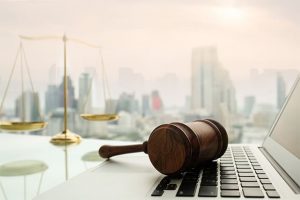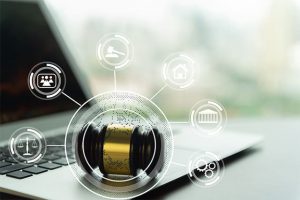Carpenter v. United States
One of the most famous Supreme Court cases which established the case for internet privacy is the Carpenter v. United States ruling. This landmark case put in writing that the government agencies involved in accessing a user’s sensitive location data on their cellphone must first obtain a warrant.
It goes without saying that the U.S. Supreme Court’s decision has had a major impact on privacy as we understand it in the digital age. Coming back to the Carpenter v. United States case, it was revealed that law enforcement agencies, in order to connect Carpenter to various robberies, tried less than ideal methods to gather evidence. They studied Carpenter’s location data spanning months via the cell phone service he had subscribed to, all without a warrant.

In the end, the police ended up knowing when and where he slept and when he went to his place of worship. The Supreme Court rightly ruled that such proof-gathering methods gave law enforcement agencies the ability to perfectly surveil any individual. Furthermore, the court said it came to the conclusion that the Fourth Amendment to the Constitution had to protect private information, which is why the need for a warrant was instated.
The Carpenter case was also very consequential for lower courts in the sense that it set a precedent for how courts are supposed to handle sensitive data when it comes to warrantless searches on part of the government. Of course, as recently as 2019, the state of Georgia argued that legal doctrines from the early part of the 20th century gave the police enough legal coverage to collect and study the data that modern vehicles collect on their drivers without a warrant.
Note:
Modern cars collect a lot of data on their drivers today. Everything from braking data to speed statistics can be tracked and recorded. Additionally, cars can also collect GPS coordinates, text history and any call record that the driver may have.Coming back to the older legal doctrines, a vehicle exemption was put in place that essentially allows law enforcement agents to search for any physical item in a car. They don’t even need a warrant to do so. According to the doctrine, since a vehicle can potentially drive away without giving the police a chance to obtain a warrant, they’re permitted to search any car as long as they have probable cause to search it.
Many activists have now argued against this old law. Interestingly, law enforcement agents at the U.S. border have used the same law to search electronic devices of people passing through. Again, warrantless.

Organizations pushing privacy rights, like the ACLU argue that authorities shouldn’t have access to any personal data without a warrant while taking coverage from old-world rules. The digital age has enabled vast amounts of data and records to be generated and people now have a reasonable expectation of privacy in all their affairs.
The Carpenter case, in this example, is relevant as it provides a way to guard against federal government agents discovering personal information via phone devices or the service that is attached to the device in question. Activists hold that since the amount of location and personal data stored on a phone is far more than in the past (where the car only had the driver’s luggage and some documents in the glove compartment or the trunk), the Fourth Amendment should be consulted to grant users more privacy rights.
Another aspect of the privacy debate that the Carpenter case handles very well is the personal information that technology firms like Google and others keep on their servers. The Carpenter case holds that digital data retains the Fourth Amendment protection even though the records are stored off-site on a third-party server.
Organizations like the ACLU have argued in the past before the First Circuit of Appeals how the above-mentioned scenario should be enough to stop government agents from warrantless searches. They seek to protect criminal rights and ensure that justice is carried out responsibly.
Katz v. United States

Another Supreme Court case that’s important for online privacy even though it happened in 1967 is Katz v. United States. In this case, Charles Katz took the government to court for wiretapping one of his phone calls which he made via a public phone booth. Katz made the call to place illegal bets on various basketball games. Katz claimed that the government violated his privacy.
Long story short, the court ruled in favor of Katz and set a precedent where people had to be given their due privacy in situations where privacy is expected. Of course, the power remains with justices and their opinion when it comes to determining if the person in question is a criminal and if their actions and movements should remain protected and private.
Of course, the world has advanced significantly since then. Does the Katz ruling support privacy in the case of a third-party public traffic camera recording someone’s movements? Should we consider Facebook a private or a public network?
The main problem with the Katz ruling is, again, the outcome of any related case is dependent on the justice involved and how technology has evolved. Societal expectations also change over time. If the government doesn’t exercise caution, it can violate some of the protections that came into existence because of the court’s ruling in the Katz case.
Attias v.CareFirst

The reason why the Attias v. CareFirst case attracted so much interest was that CareFirst, Inc., a health insurer, became a victim of a huge data breach in June 2014. Upon further investigation, it turned out around 1.1 million policyholders had their confidential details compromised. Sure enough, customers sued CareFirst and wrote that it had violated state laws as it could not safeguard their private information.
However, a district court approved a motion to dismiss after CareFirst brought it forward based on the fact that the company hadn’t disclosed any identity theft incident. The plaintiffs then appealed to the U.S. Court of Appeals for the District of Columbia Circuit. The earlier ruling was overturned as the court held that it was sufficiently plausible that victims of the data breach had an increased risk of future injury as cybercriminals could use the stolen data for future wrongdoings.
CareFirst then filed a case with the Supreme Court and a decision is still pending. Whatever decision the courts rule in the end, it would have big consequences for future data breach litigation as victims can sue firms for not giving them sufficient privacy protections. It will also be of interest because it may allow companies to relieve themselves of any responsibility in cases where victims of data breaches suffer future identity theft attempts.
Google Settlement

Google apparently shared the search queries of its users with various third-party websites which the users wrote was a violation of their privacy. They brought a class-action lawsuit against Google.
However, Google quickly agreed on a settlement worth $8.5 million. With the use of an unsigned opinion, the justices dismissed a ruling from the lower courts that had previously upheld the settlement.
The lawsuit accused the search engine technology company of not adhering to a 1986 law. That law regulates how companies are supposed to store and protect electronic communications.
The Supreme Court was of the opinion that the amount Google had agreed to in the settlement only served lawyers and a handful of victims. Instead, such cases would be better served if the settlement amount would go to organizations that advance the cause of digital privacy. The case is still standing while the Supreme Court gets to decide what exactly is needed for plaintiffs in this case to fulfill requirements of legal standing.
Riley v. California

The justices had another opportunity in 2014 in the Riley v. California case to reinterpret current rules and regulations concerned with digital privacy. As established in some other cases, the police often don’t take the Fourth Amendment into consideration when searching suspects. But in the Riley v. California case, the court set some boundaries for the police when it came to gathering evidence on a suspect via their phone number.
Note:
Modern phones have a tremendous amount of information on the person they belong to. And just because there’s tons of information available doesn’t mean it’s any less valuable than a small quantity of information, which would’ve been the case in previous times.The ruling was in stark contrast to previous Supreme Court rulings where justices regularly changed the way they interpreted the Fourth Amendment in the case of new technologies being deployed in the public to assist the police in their efforts to gather information to support their case.
Conclusion: The Fourth Amendment and the Reasonable Expectation of Privacy in the Digital Age

The Carpenter case showed that the U.S Supreme Court had a reasonable understanding of how the digital age has changed the way privacy should be handled and protected. The federal government’s stance for advocating complete access to any user record a related firm may have is somewhat understandable.
Current rules and regulations will have to be interpreted in new ways to ensure no entity can exploit personal information such as sensitive location data and website usage data. Techniques that are too invasive or manipulative must be banned as they can be used to identify and implicate an individual person.
This is important:
The digital age has revitalized privacy as one of our most critical rights. Without privacy protections at the individual level, there’s little point in individuals using technology or conducting any form of confidential business. By extension, a democracy simply cannot function without sufficient safeguards for privacy.